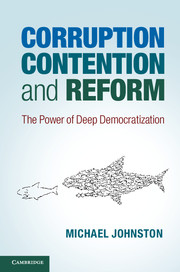Book contents
- Frontmatter
- Dedication
- Contents
- List of Figures
- List of Tables
- Preface
- Acknowledgments
- 1 Reform in an imperfect world
- 2 “Deep democratization” and the control of corruption
- 3 First, do no harm – then, build trust: reform in fragile and post-conflict societies
- 4 Official Moguls: power, protection . . . and profits
- 5 Oligarchs and Clans: high stakes and insecurity
- 6 Elite Cartels: hanging on with a little help from my friends
- 7 Influence Market corruption: wealth and power versus justice
- 8 Staying power: building and sustaining citizen engagement
- Appendix Recognizing the syndromes of corruption
- References
- Index
1 - Reform in an imperfect world
Published online by Cambridge University Press: 05 June 2014
- Frontmatter
- Dedication
- Contents
- List of Figures
- List of Tables
- Preface
- Acknowledgments
- 1 Reform in an imperfect world
- 2 “Deep democratization” and the control of corruption
- 3 First, do no harm – then, build trust: reform in fragile and post-conflict societies
- 4 Official Moguls: power, protection . . . and profits
- 5 Oligarchs and Clans: high stakes and insecurity
- 6 Elite Cartels: hanging on with a little help from my friends
- 7 Influence Market corruption: wealth and power versus justice
- 8 Staying power: building and sustaining citizen engagement
- Appendix Recognizing the syndromes of corruption
- References
- Index
Summary
If men were angels, no government would be necessary. If angels were to govern men, neither external nor internal controls on government would be necessary. In framing a government which is to be administered by men over men, the great difficulty lies in this: you must first enable the government to control the governed; and in the next place oblige it to control itself.
– James Madison, The Federalist Papers, 51Restraining power
Let us begin with a simple proposition about a complicated problem. Corruption will continue – indeed, may well be the norm – until those with a stake in ending it are able to oppose it in ways that cannot be ignored.
Corruption is tenacious – often sustained by powerful incentives and, at times, protected by violence. The contemporary anti-corruption movement enjoys broad-based support, and can point to genuine accomplishments in terms of analysis and public awareness over the past generation. Yet particularly where reform has been most urgently needed, lasting reductions in corruption have been elusive (Mungiu-Pippidi 2006; Birdsall 2007; DFID 2009; United Nations 2010). The difficulty of measuring corruption makes any such judgment impressionistic: we can never know just how much corruption a society experiences, and tracing trends is even more difficult. Still, despite successes at the level of specific programs and agencies it is difficult to point to sustained and significant reductions in corruption in whole societies. Hong Kong and Singapore have had widely recognized success, but both are city-states whose undemocratic regimes could force extensive change, and where the economic benefits of reform could rapidly become apparent. Botswana teaches us important lessons about the value of socially rooted leadership but its population, spread over a large area, is just a quarter of Hong Kong’s. Japan and Belgium are perceived as having made steady progress, but already had solid national institutions in place. Korea, Indonesia, Ghana, and Taiwan are promising cases worth watching closely. Overall, however, the results of a generation’s hard work in pursuit of reform are not encouraging.
- Type
- Chapter
- Information
- Corruption, Contention, and ReformThe Power of Deep Democratization, pp. 1 - 28Publisher: Cambridge University PressPrint publication year: 2013



